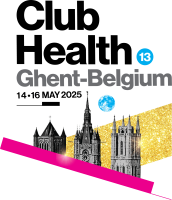INVITED SPEAKERS
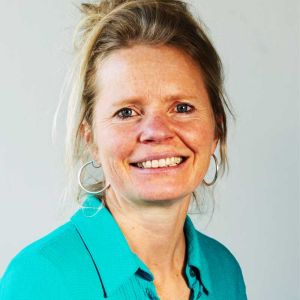
Annemie Coone
Annemie Coone has a Master in Criminology and Bachelor in Social Work. She is researcher and lecturer at the HOGENT - Belgium. She worked several years as interregional drug prevention coordinator. Her work at the University College focuses on research and training/ lecturing in the field of prevention towards substance use. She is master trainer in the EUPC (European Universal Prevention Curriculum) for EUDA and involved in several EC-funded projects.
Organisation: HOGENT - University College for applied Sciences and Art
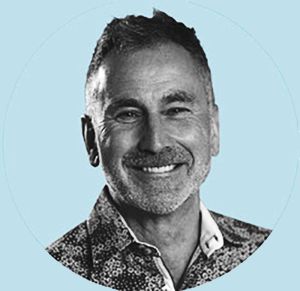
Adam R Winstock
Adam is a Consultant Addiction Psychiatrist and Addiction Medicine specialist based in London with diverse clinical and research interests including neurodiversity. He is also Substance Misuse Clinical Advisor NHS England (Health & Justice London) and Honorary Clinical.
Adam is an active clinician, educator and researcher, having published over 200 papers and book chapters on everything from clubbing and drugs, opioid treatment and service delivery to dark net drug markets, health messaging, drug education, sex and drugs, drug policy, cannabis, novel drugs, ketamine, nitrous and psychedelics. He is also founder of the Global Drug Survey and creator of the Staying Safe Program - SSP (www.stayingsafe.university). along with a new programme for parents (www.stayingsafeparents.com). He is passionate about harm reduction and developing effective treatment structures that have people’s needs at their core. He believes honest non-judgemental information delivered with curiosity and credibility is the foundation for people making informed decisions about their health and wellbeing. He likes old school rare grove, funk and 1980s house and garage.
Abstract
Neurodiversity on the dancefloor
Neurodiversity is one of the most unrecognised but increasingly spoken about and misunderstood mental health conditions. Effecting approximately 10% of the population including 4 to 5% of adults it’s not a deficit it’s a different of processing the world outside and within. There is a strong multimodal link between ADHD, particularly when it’s untreated and substance use. The link between neurodiversity and the dance floor is just as complex. There are aspects of neurodiversity that support the creativity and novelty of nightlife economies, and it is likely that there is overrepresentation of dance music artists and promoters with ADHD. Clubbers may find clubbing a safe place, finding solace and anonymity as they meld into the chaos of movement, light and sound, where nonverbal communication trumps the spoken word. But it can overwhelm others. Some find drugs. What can start as hedonistic drug experimentation can end as problem drug use or self-medication. The dancefloor is a place to celebrate difference. People with neurodiversity may thrive in environments better suited to their needs. Inclusive nightlife should bring communities together. Those with ADHD may need specific harm reduction strategies to optimise pleasure and minimise the risk of medication-drug interactions. Empathy for the diverse needs of a neurodivergent population is good for everyone. In this talk I will try to explain why and how we can achieve it. PS I get to wear my psychiatrist’s hat in this one.
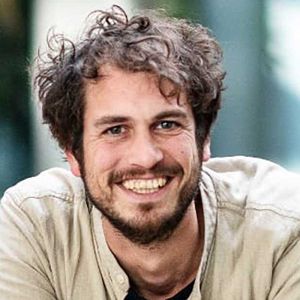
Sebbe Vaessen
Sebbe is a prevention and harm reduction expert at VAGGA, a key mental health organization in Antwerp. In Flanders he is also active for the peer support project Safe ‘n Sound, which focuses on health promotion and drug harm reduction in nightlife. Sebbe tries to professionalize their efforts through international collaborations and knowledge exchange and has been dedicated to improving health- and drug policies, both locally and specific to nightlife organizations. With a focus ranging from drug use to mental health and sexual violence, Sebbe is always trying to advocate for shared responsibility and effective approaches in line with the concerns and challenges of the public.
Sebbe will deliver an Interactive workshop along with Raoul Koning and Alex Karden.
Understanding drug combinations: insights and answers from harm reduction perspective
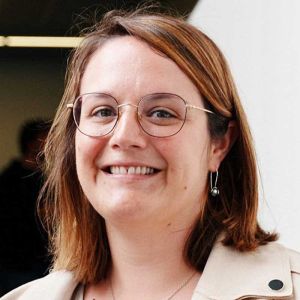
Marijke De Veirman
Marijke is a senior researcher at Artevelde University of Applied Sciences, where she leads the research program Branding through social media and content creators within the Communication, Media and Design expertise network. One of the key projects is the SMI Barometer, an annual study that dives into how young Belgians use and perceive (marketing through) social media and influencers. During her PhD at Ghent University (2019), she explored the mechanisms and ethical dimensions of influencer marketing.
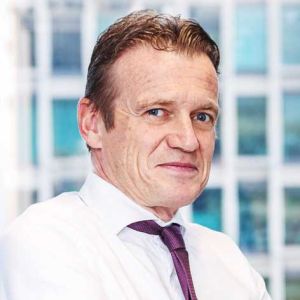
Paul Van Tigchelt
Until February 2025, Paul Van Tigchelt was the Deputy Prime Minister and Minister of Justice. Prior to that Paul was Deputy Public Prosecutor in the Public prosecutor’s office and Deputy Attorney General in the Prosecutor General's office in Antwerp. Paul was mostly in charge of drug-related offences including a special focus on the cocaine market through the port of Antwerp and drug use at festivals.
Paul’s presentation title is Belgian drug policy: a regulatory framework

Eva Blomme
Eva is the project manager cocaine prevention at the Flemish Expertise Centre for Alcohol and Other Drugs (VAD) in Flanders, Belgium. At VAD, she conducts research on cocaine use and explores different prevention interventions to reduce the use of cocaine. She holds a PhD in in Criminological Sciences and specializes in (Belgian) Drug Policy and evaluation.
ABSTRACT
Title: Drug prevention through social media – collaborating with peer influencers
After cannabis, cocaine is the most commonly consumed illicit drug in Europe. Cocaine availability is reported to be at an all-time high and snorting cocaine is increasingly perceived as normalized in settings like nightlife and even in certain work contexts. In 2024, VAD/Druglijn launched a selective prevention campaign to address this. With targeted ads on social media and through collaboration with peer influencers, VAD/Druglijn helps people who have questions about their cocaine use to get further information and self-help. At the same time, the campaign offers a counter-narrative to the perception that cocaine “is an integral part of nightlife"
In this panel, Robin (peer influencer) and Eva (VAD) discuss their collaboration and their experiences with the campaign. Robin elaborates how he engages with his followers about drug use from his perspective as an online peer and integral part of the scene. Eva clarifies the scientific foundation from which the campaign starts and highlights the benefits and challenges of using social media for drug prevention.
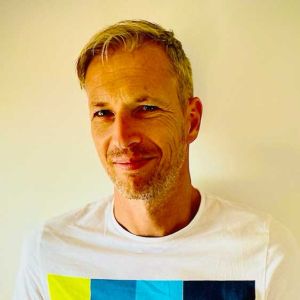
Jochen Schrooten
Jochen Schrooten is a criminologist with over 20 years of experience in nightlife harm reduction. As a staff member at the Flemish Expertise Centre for Alcohol and other Drugs (VAD), he has been instrumental in the development, implementation, and evaluation of various prevention and harm reduction methodologies related to substance use in nightlife settings. Jochen is also the founding father of Safe 'n sound and a board member of NEWnet, the European safer nightlife organization, and is committed to creating safer, more inclusive nightlife experiences.
ABSTRACT
Title: Spiking realities: Challenging myths and shifting the focus from fear to respect in nightlife culture
As humans, our fundamental need for connection drives much of our behaviour. Yet, the path to healthy relationships is complex, and substances like alcohol and other drugs often become intertwined with social interactions. This presentation delves into how the misuse of substances can lead to drug-facilitated sexual assault, highlighting the critical need to shift away from fear-based narratives surrounding spiking.
This talk will present data from a recent study conducted in A&E services in Ghent hospitals regarding spiking and drug-facilitated sexual assault. The surprising outcomes challenge the media's tendency to reinforce the myth of spiking. Instead, we advocate for empowering clubbers through connecting values such as openness, honesty and respect. By emphasizing personal responsibility and mutual care, we can cultivate a nightlife culture where healthy relationships can thrive.
This keynote will share recommendations from a recent international research project and showcase effective interventions in addressing gender-based sexual violence. These interventions, rooted in the core values of connection, offer a path forward that transcends the limitations of focusing solely on spiking incidents.
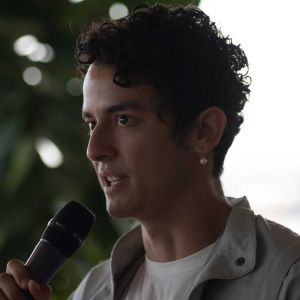
Erich Joseph
Erich is a cultural manager, musician, and educator dedicated to improving mental health structures within club culture. Based in Berlin, he has been working with Clubcommission Berlin for five years, advocating for sustainable and resilient club environments. With a background in social pedagogy and mental health prevention, he initiated the "Mental Health in Clubs" project in 2023, a platform dedicated to developing research-based strategies that strengthen mental well-being among club workers and organizations.
In collaboration with Charité, the German Psychological Society, and Fern Universität in Hagen, this initiative explores preventive mental health structures and resilience programs tailored for clubs. Erich’s work bridges research and practice, helping clubs build healthier organizational cultures that support both their teams and long-term sustainability.
Beyond his work in club culture, Erich is a speaker and university lecturer, teaching project management and mental health in the creative industries. Through his lectures and talks, he equips the next generation of cultural professionals with tools to navigate the challenges of creative work while fostering sustainable career paths.
ABSTRACT
Title: Enhancing Occupational Mental Health in Nightlife Settings – The 'Mental Health in Clubs' Initiative
Background: The nightlife industry is a cornerstone of cultural expression and economic activity, yet its workforce often encounters unique occupational challenges. Irregular hours, high emotional demands, and limited access to structured support systems contribute to increased stress and mental health risks among club workers. Addressing these concerns is essential for fostering a sustainable and healthy nightlife environment.
Objective: This presentation aims to share insights from the 'Mental Health in Clubs' project, focusing on the development and implementation of evidence-based interventions to enhance mental well-being and organizational resilience within club settings.
Methods: In collaboration with Charité Berlin, the German Psychological Society, and Fern Universität in Hagen, we conducted a comprehensive analysis involving focus groups, surveys, and direct interventions across various club environments. The study identified key stressors and tailored solutions to address mental health challenges faced by club staff.
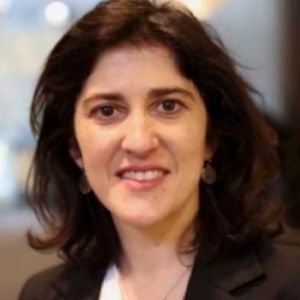
Christine Merckx
As manager of Event Confederation, Christine Merckx is the spokesperson of the Belgian event sector. Event Confederation unites, represents, defends and informs all event professionals active in the profit, non-profit and public sector.
With a background in strategy, marketing and research, Christine Merckx founded and led the first center of expertise for the event sector over the past decade. As a pioneer in this applied scientific impact research domain, Christine Merckx is convinced that to become an officially recognised sector that promotes unity and strength, it must be driven by passion, entrepreneurship, data and insights.
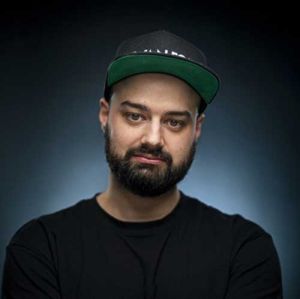
Robin Van Genechten
Robin is a world-class sound engineer and mentor specializing in techno and electronic music, with years of experience in the industry. Having once been a workaholic, Robin has undergone a personal transformation and now focuses on promoting mental well-being and self-care. As an influencer, Robin was part of an online campaign with VAD (Flemish Expertise Centre for Alcohol and Other Drugs), using his platform to raise awareness about the connection between mental health and problematic substance use. He uses both his personal knowledge and professional expertise to guide others in their musical adventures.
Robin is passionate about helping people break free from negative, destructive mindsets or beliefs and cultivate a positive, mindful approach to both their personal and professional lives through a combination of sound engineering and mental health coaching.
